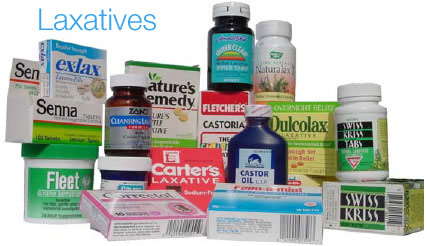Laxatives
Constipation Treatment
Laxatives are substances taken for treating constipation. They are of two basic kinds: oral and rectal. Oral laxatives
may come in the form of a liquid, tablets, powders, or wafers. Rectal laxatives
are available in the form of suppositories or enemas.
As a general rule, it is best to avoid using over-the-counter laxatives. Diet and lifestyle changes should be tried first to treat your constipation. Only if these are unsuccessful should you ask your doctor about using a laxative.

Not only are laxatives habit-forming, but can also cause a number of undesirable side-effects. The only exception is fiber supplements
or bulk laxatives, which are sometimes prescribed for daily use. Most other kinds of laxatives work by causing muscle contractions in the intestine, which can lead to problems if used on a regular basis.
Types of Oral Laxatives
There are several different types of laxatives, which vary greatly in terms of safety and strength. The most common ones are described below.
Fiber Supplements / Bulk Laxatives, which contain psyllium, are considered the safest of all laxatives. They add bulk and water so your stool can be eliminated more easily and comfortably. They are mild enough that doctors often prescribe them for everyday use. You should start using bulk-forming laxatives slowly to give your body time to adjust. Increase the amount used gradually until you get the desired effect. These laxatives may be mixed with juice or water. You may experience gas, bloating or cramping if you start using fiber supplemts too quickly. Examples are Metamucil, Fiberpur, novo-Mucilax, Prodiem Plain and Fibyrax.
Lubricant Laxatives contain mineral oil and are used only for short-term treatment. The mineral oil coats the stools, softens them and enables them to pass through your colon more easily. However, the oil stays within the intestine, and if used over a long period, has several disadvantages. For example, the oil may absorb important vitamins, leading to potentially dangerous vitamin deficiencies. Examples are mineral oil and Fleet.
Stool Softeners or Emollient Laxatives contain a wetting agent, called docusate, which moistens and softens the stool. These laxatives are often used to make defecation easier after childbirth, surgery or heart attacks. It is also prescribed for those who suffer from haemorrhoids or anal fissures. Examples include Surfak and Colace.
Stimulant Laxatives cause rhythmic contractions in the intestine and colon, to help you expel stool more rapidly. Though stimulant laxatives can treat constipation quite effectively, they can also set off severe diarrhea, resulting in dehydration and electrolyte deficiency. Regular use of stimulant laxatives could also damage the colon. Examples are Ex-Lax, Purge, Feen-A-Mint, Dulcolax, Senokot and Correctol.
Saline Laxatives attract water into the colon by increasing the concentration of salts in the stool. The resulting effect is softer feces, which are easier to eliminate. Saline laxatives contain ions such as magnesium, suphate, and phosphate, which may be partially absorbed into the body and could be dangerous for some individuals. Because they generally act within a few hours, stronger saline laxatives should not be used regularly, as they can lead to diarrhea and dehydration. Milk of Magnesia is the mildest of the saline laxatives and Epsom Salts are the strongest. Examples are Milk of Magnesia, Haley’s M-O, Citrate of Magnesia, Epsom Salts.
Home Remedies
From ancient times, people have had constipation! As a result, around the world, people have discovered a variety of natural compounds or foods that can induce a bowel movement. Most of these natural laxatives are made of vegetables or fruits. Homemade laxatives should be used with caution for two reasons: one, they have not been scientifically tested and two, if used in excess, they could cause diarrhea.
Some of the most popular home remedies for constipation are listed below:
- Mix the juice from half a lemon into a glass of warm water and drink in the morning.
- Drink aloe vera juice in the morning and evening.
- Eat a bael fruit or drink its juice for an effective cure to constipation.
- Have a glass of prune juice.
- Add a teaspoon of corn syrup to a glass of water and drink.
- Have a teaspoon of castor oil first thing in the morning.
- Drink a glass of pear juice.
- Have some plain yogurt, mixed with sugar.
Dangers of Laxatives
 Laxatives are habit-forming and should be used only as a last resort. As your intestines grow accustomed to them, you could lose muscle tone in the bowels, causing “lazy bowel syndrome”. Long-term laxative abuse can lead to colon failure, or even death.
Laxatives are habit-forming and should be used only as a last resort. As your intestines grow accustomed to them, you could lose muscle tone in the bowels, causing “lazy bowel syndrome”. Long-term laxative abuse can lead to colon failure, or even death.
Laxatives can also affect the way in which the body absorbs medicine and damage the stomach lining. If you are taking a prescription medicine, you should inform your doctor before taking a laxative. They can cause the body to become dehydrated, as well as produce gas-related pain, bloating, and severe abdominal pain.
Laxatives can deplete the body of essential minerals such as sodium, potassium, and magnesium. The resulting electrolyte imbalance can cause spasms, muscle cramps and irregularities in heartbeat.
Laxatives may be unsafe for pregnant women, as they can cause contractions in the womb. They may also be unsafe for nursing women, as they can pass into the breast milk and cause diarrhea in babies. Children under the age of 6 should not be given laxatives without the recommendation of a doctor.
If you experience side effects such as asthma, dizziness, dehydration, muscle cramping, nausea or irregular heartbeat after using a laxative, contact a doctor immediately.
